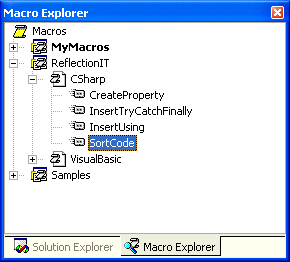You should write your code in a consistent style. This is easier said then done. The SortCode macro helps you with this by sorting your C# code.
The SortCode macro sorts all members of a type (class or struct) on alphabetical order grouped by their type.

The default order of the types is:
- Events
- Fields
- Enums
- Constructor
- Destructor
- Properties and Functions
- Properties and Functions of implemented interfaces
I find Regular Expression powerful but difficult. Eric Gunnerson wrote the Regular Expression Workbench. This makes them easy.
It's a tool to create, test, and study regular expressions with this workbench. With the "Examine-o-matic" feature, hover over the regex to decode what it means
www.sellsbrothers.com
.NET Framework Service Pack 2
I have found a class that allows for balloon shaped forms in .NET.
Have a look at CodeProject.
What happened with the XML WebServices Award on the GotDotNet website? I have submitted my Html2Xml webserivce. I don't expect to win the 25.000 dollar price, an X-box would be nice :-)
The winners would be announced at the Teched in Barcelona (1-5 July 2002). Then this was moved to July 12. It is now August. Nothing has happened. Is there no winner?
Strange!
Most commercial WinForm applications have a SplashScreen. This article explains how you can implement one using the Microsoft .NET Framework.

Example: Visual Studio.NET SplashScreen
I have found the opensource project/tool NDoc which compiles the C# Xml Documentation to MSDN like help file.
It works great!
I think I have found a Bug in VB.NET (Final)! I can't compile the following program (Build Error:
'Private Function Foo() As Integer' and 'Public Function Foo() As String' cannot overload each other because they differ only by return types. ). It worked in Beta2 of VB.NET.
Public Interface ITestInterface
Function Foo() As Integer
End Interface
Public Class TestClass
Implements ITestInterface
Private Function Foo() As Integer Implements VBBug.ITestInterface.Foo
Return 1
End Function
Public Function Foo() As String
Return "2"
End Function
End Class
I don't like COM+. I have never liked it but I had to use it when I needed Distributed Transactions. At the Teched 2002 in Barcelona I learned how you can use Distributed Transactions without COM+.
My problem with COM+ is the fact that you only can choose one transactiontype for a class. You can not differentiate it per method.
Download the following Zip file and have a look at Ron Jacobs example project and slides.
Be carefull, this only works on Windows XP. It uses some lowlevel COM+ 1.5 features.

